Riyadh, MINA – Two Muslim countries that have been fighting over influence in the Middle East, namely Saudi Arabia and Iran, are now entering a new chapter in regional cooperation.
The Saudi crown prince said in a televised interview this week that his country wanted good relations with Iran. This statement marked the end of Riyadh’s tough stance on Tehran.
“We want Iran that is prosperous and has common interests with each other, but our problem is their negative actions, such as its nuclear program or support for banned militias in the region, or its ballistic missile program,” bin Salman told Al Arabiya TV.
“We are working with our partners to solve this problem, and we hope to solve it and have a good and positive relationship with everyone,” he added.
Also Read: Turkiye Denies $393.7 Million Export Claims to Israel, Calls Reports ‘Disinformation’
The British daily The Financial Times even recently reported that a Saudi and Iranian delegation had met in the Iraqi capital, Baghdad, on April 9.
According to the report, the meeting was aimed at easing tensions between regional rivals. The attack on Saudi Arabia by Yemen’s Houthi rebels was also part of the discussion.
The report claims the two sides agreed to hold another round of talks.
This Saudi Arabia invitation is not unrequited. Iran welcomes a change in Saudi Arabia’s approach to Tehran-Riyadh relations.
Also Read: Turkish and Iranian Presidents Meet in Azerbaijan
Iran’s Foreign Ministry on Thursday welcomed Saudi Crown Prince Muhammad bin Salman’s remarks on Tehran-Riyadh relations.
“Iran and Saudi Arabia, as two important countries in the region and the Muslim world, can enter a new phase of interaction and cooperation to achieve regional peace, stability and development by adopting a constructive and dialogue-based approach,” said Foreign Ministry spokesman Saeed Khatibzadeh in a statement.
The two countries have been at odds with each other for a long time, so the emergence of plans to improve cooperative relations is quite surprising.
A Middle East expert from the University of Indonesia, Yon Mahmudi, admitted that he was quite surprised by the change in policy between the two countries, especially from Saudi Arabia.
Also Read: Iran Reaffirms Commitment to Uranium Enrichment
According to Yon, the cause was none other than the change in government policy in the United States from Trump to Joe Biden.
“These two countries are very much influenced by American policies. On the one hand, Saudi Arabia is very close to America, while Iran is anti-American,” said Yon as quoted from Anadolu Agenc.
In fact, in its history, the two countries had been together and became close friends of America before the Iranian revolution.
“There seems to be some kind of relaxation of relations between America and Iran and that will affect the Saudis,” Yon said.
Also Read: Israel Breaks Ceasefire, Launch Deadly Strike on Lebanon
In the case of Yemen, where Iran supports rebel Houthi militias, the United States is not now labeling as a terrorist.
In addition, Biden stated that he no longer supports Saudi operations in Yemen by supporting the Yemeni government. Even Biden stated that Saudi Arabia had lost in Yemen.
This paved the way for Saudi Arabia who is also involved in the war in Yemen to make peace.
As for the expert on Iran, who is also the head of the Department of Arabic Literature at the University of Indonesia, Bastian Zulyeno, said the plan to improve Saudi-Iranian cooperation is still too early.
Also Read: Prabowo, Prince MBS Call for Concrete Action to End Gaza Crisis
“This step is still too small, this is the first small step. So we cannot predict what the future will be like,” said Bastian.
According to Bastian, the change in Saudi Arabia’s approach occurred because the country had spent a lot of money to finance Yemeni government forces for approximately five years.
Another cause is economic motives from Saudi Arabia and Iran, said Bastian.
As the largest oil producing countries in the Middle East, Iran and Saudi Arabia have an interest in exporting oil to China in order to reduce their losses due to oil prices, which in recent years have experienced a sharp decline.
Also Read: Iranian Media Highlights Threat of New War, Calls for National Unity
By making peace, the two countries will benefit from the oil trade with China. Meanwhile, China has an interest in the two oil-producing countries to open a silk route to Europe through the Middle East.
Changes in the policies of these two countries will affect not only the Middle East region, but also between Muslim countries in the world, such as Indonesia and Pakistan, which have the largest Muslim population in the world.
Pakistani Prime Minister Imran Khan welcomed the peace initiative of the two Muslim countries.
The peace initiative between the two countries will strengthen the global Muslim community, Imran Khan said on Twitter.
Also Read: Iranian FM Says Uranium Enrichment Technology Indestructible by Bombs
“We welcome the KSA [Kingdom of Saudi Arabia] initiative for peace with Iran. Iran is our neighbor and KSA is our closest friend. This peace initiative will strengthen Muslims, “Imran tweeted late Wednesday.
For the Middle East region, the conflicts that have been rife so far are expected to subside, said Yon.
So far, Iran and Saudi have been fighting for influence in the Middle East region. In fact, both of them also threw accusations at each other.
Iran is seen as being heavily involved in various conflicts in the region, such as in Iraq, Lebanon, and Syria.
Also Read: Yemen Claims Ballistic Missile Attack on Israel’s Ben Gurion Airport
Meanwhile, in Iran’s perception, the Saudis were seen as too meddling in the affairs of countries in the Middle East region, explained Yon.
“The cooperation between the two countries will reduce the potential for conflict. This will also affect other countries, including Indonesia,” said Yon.
If politically the two countries are at peace, Muslim countries will no longer be involved in a proxy war between the two countries.
“The economic potential of Saudi Arabia and Iran can be utilized by Muslim countries including Indonesia to cooperate more freely to improve economic relations,” said Yon.
Also Read: Israeli Website Hacked: 462 Soldiers and 6 Generals Killed by Iranian Missiles
So far, said Yon, cooperation with Iran and Saudi Arabia has often been overshadowed by accusations of being pro-Saudi or pro-Iran.
In the future there will be no more proxy barriers for countries wishing to cooperate with Saudi or Iran, added Yon.
Even so, the plan for cooperation with Saudi Arabia still depends on Iran internally.
Whether Iran will really cooperate solidly with Saudi Arabia remains unanswered at this time, Bastian said.
Also Read: Global Trade Unions Demand End to Israeli Aggression in Gaza
Unlike the case with Saudi Arabia, whose policies depend a lot on the crown prince bin Salman.
“Inside Iran it is complex, with its unique system,” said Bastian. (T/RE1)
Mi’raj News Agency (MINA)






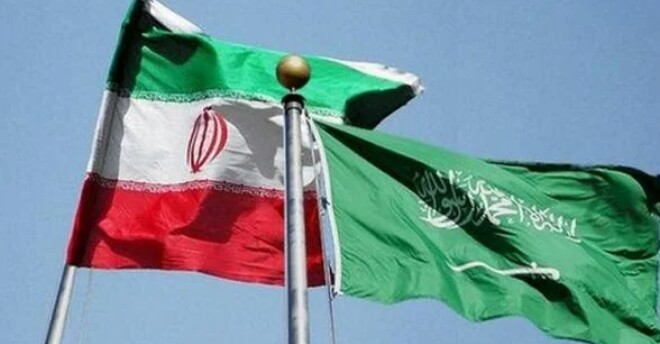










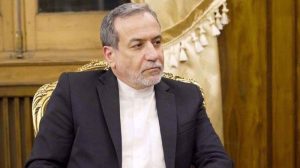
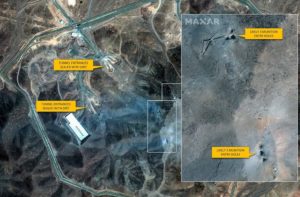
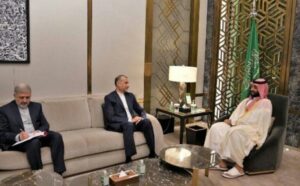
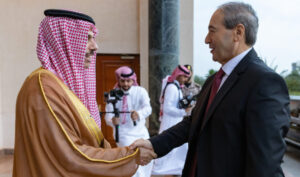
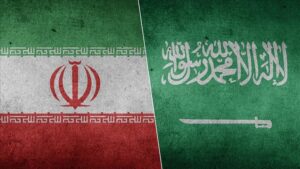






![MUI Chairman for Foreign Relations and International Cooperation, Sudarnoto Abdul Hakim (center) at the One Million Women for Gaza Press Conference entitled "Women Boycott Pro-Israel Products" held at the Swiss-Belinn Cawang Hotel, East Jakarta, Thursday (3/7/2025). [Photo: Arina/MINA]](https://en.minanews.net/wp-content/uploads/2025/07/20250703_144042-scaled-1-300x225.jpg)
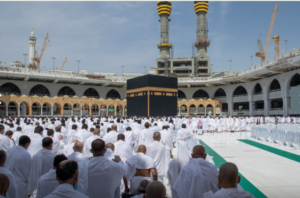




 Mina Indonesia
Mina Indonesia Mina Arabic
Mina Arabic